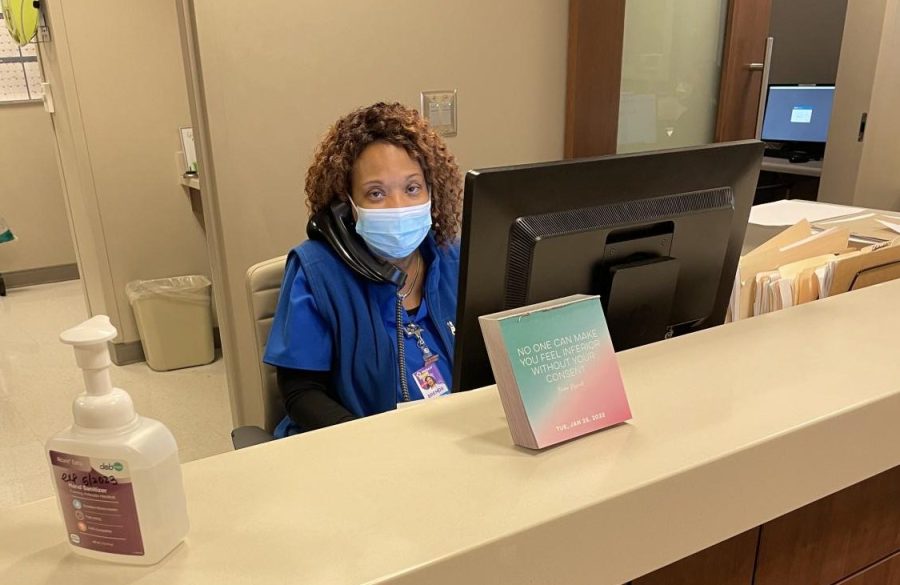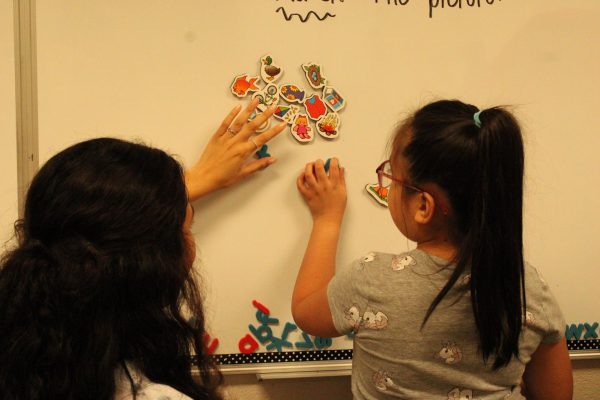Endocrinology medical assistant during times of Covid
Brenda Worthan works at Wellstar in the endocrinology department. Her day consists of rooming patients, answering phone calls and reviewing labs. COVID-19 impacts life in the healthcare industry, so the assistant must clean her area frequently and wear her mask. However, the pandemic will not stop Worthan from making a difference in her community and helping patients in need.
January 27, 2022
Endocrinology studies hormones in the human body using diagnostic technology to detect problems. Endocrinologists treat diseases that deal with the endocrine system such as diabetes, infertility, growth issues and various cancers. The COVID-19 pandemic impacts the number of endocrinology patients a physician sees, specifically those with diabetes. Countless patients require physical activity to reduce the severity of their disease, and the inability to travel outside due to quarantine greatly affected them.
Problems with the endocrine system also impact high school students. For example, managing diabetes while still in high school requires hard work. Students must communicate any problems with their teachers and school nurse. They should also inform their friends. If they happen to experience a medical emergency, their friend might know how to help them.
Brenda Worthan, a medical assistant, works at Wellstar in the endocrinology department. She performs alongside fellow doctors and medical assistants to help patients in need. They aid in restoring the normal balance of hormones in the body, providing vital care to patients all around the world.
Worthan wakes up during the shy hours of five a.m. She turns on her coffee pot and while brewing, she gathers her scrubs to put on. On certain mornings, along with her coffee, she makes a breakfast smoothie to provide energy for the taxing day ahead. Worthan grabs her cup of coffee and heads up the stairs to carry on her morning routine.
Worthan leaves her house at 6:45 am and it takes her 25 minutes to drive to work. She clocks into work between 7:30 and 7:35 am, the sun barely rising above the horizon as she starts her day.
“Once I get clocked in, I wipe down the tables and blood pressure cuffs using sanitized wipes. Next, I change all the papers on the examination tables if not done the night before,” Worthan said.
Sanitizing all surfaces plays a tremendous role in the healthcare industry. Long before the world altered their regular cleaning schedules due to the pandemic, hospitals required numerous measures to ensure patient safety. However, due to the dramatic change, healthcare workers instilled countless more rules. Physicians may not do the same jobs they used to and the process of actually seeing patients changed as a consequence of COVID-19. The disease limits patient-physician contact, so guests and staff must wear masks at all times, restraining the connection patients obtain with their healthcare provider.
“I welcome patients into the room and verify their name and birthday. Next, I take the patients’ blood pressure. If the patient is being seen for diabetes, I also check their blood sugar. All charting is done in the room,” said Worthan.
When Worthan finishes her checkup, the doctor sees the patient. In most cases, the appointment does not last too long. The doctor and patient discuss insurance and medication. Sometimes, talk of surgery also takes place.
When Worthan does not need to room a patient, she does paperwork, answers phones and calls patients with results from their labs. Cleaning the office also takes place during Worthan’s downtime. Patient and healthcare provider safety requires a great deal of attention, especially in times of COVID-19. New variants of the disease make it hard for everyone to stay safe, but not impossible.
“The advice I would give to people in order to stay safe during the pandemic would be to consider taking vitamins or some immune support to build your immune system. Wear your mask and wash your hands. Keep your distance and sanitize your hands. Get your vaccine,” said Worthan.
Worthan sees an average of 20 patients a day. Each one comes with their own questions, diseases, and requires different treatments. Worthan ends her shift by finishing up all charting and filing any paperwork for the doctor. She sanitizes her desk and the lobby area and gathers any lunch she did not finish during the day before heading to the backroom to clock out. On a great day, Woorthan clocks out between 4:15 and 4:30 pm. Worthan heads to her car and drives home in the midday traffic, reflecting on all the patients she saw that day. She knows that she makes a difference in the world along with her fellow doctors and medical assistants.

















